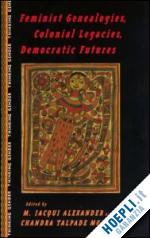Colonial Legacies, Capitalist State Practice, and Feminist Movements; Chapter 1 Women Workers and Capitalist Scripts: Ideologies of Domination, Common Interests, and the Politics of Solidarity, Chandra Talpade Mohanty; Chapter 2 “A Great Way to Fly”: Nationalism, the State, and the Varieties of Third-World Feminism, Geraldine Heng; Chapter 3 Sheroes and Villains: Conceptualizing Colonial and Contemporary Violence Against Women in Africa, Amina Mama; Chapter 4 Erotic Autonomy as a Politics of Decolonization: An Anatomy of Feminist and State Practice in the Bahamas Tourist Economy, M. Jacqui Alexander; Chapter 5 Civil Rights versus Sovereignty: Native American Women in Life and Land Struggles, Marie Anna Jaimes Guerrero; Crafting Selves, Reimagining Identities and Cultures; Chapter 6 Postmodernism, “Realism,” and the Politics of Identity: Cherríe Moraga and Chicana Feminism, Paula M. L. Moya; Chapter 7 Probing “Morality” and State Violence: Feminist Values and Communicative Interaction in Prison Testimonios in India and Argentina, Kavita Panjabi; Chapter 8 Toward a Genealogy of Black Female Sexuality: The Problematic of Silence, Evelynn M. Hammonds; Chapter 9 Post–Third-Worldist Culture: Gender, Nation, and the Cinema, Ella Shohat; Anatomies of Organizing, Building Feminist Futures; Chapter 10 Ring Ding in a Tight Corner: Sistren, Collective Democracy, and the Organization of Cultural Production, Honor Ford-Smith; Chapter 11 Looking at Ourselves: The Women's Movement in Hyderabad, Vasanth Kannabiran, Kalpana Kannabiran; Chapter 12 The Dynamics of WINning: An Analysis of Women in Nigeria (WIN), Ayesha M. Imam; Chapter 13 The Public/Private Mirage: Mapping Homes and Undomesticating Violence Work in the South Asian Immigrant Community, Anannya Bhattacharjee; Chapter 14 One Finger Does Not Drink Okra Soup: Afro-Surinamese Women and Critical Agency, Gloria Wekker;












